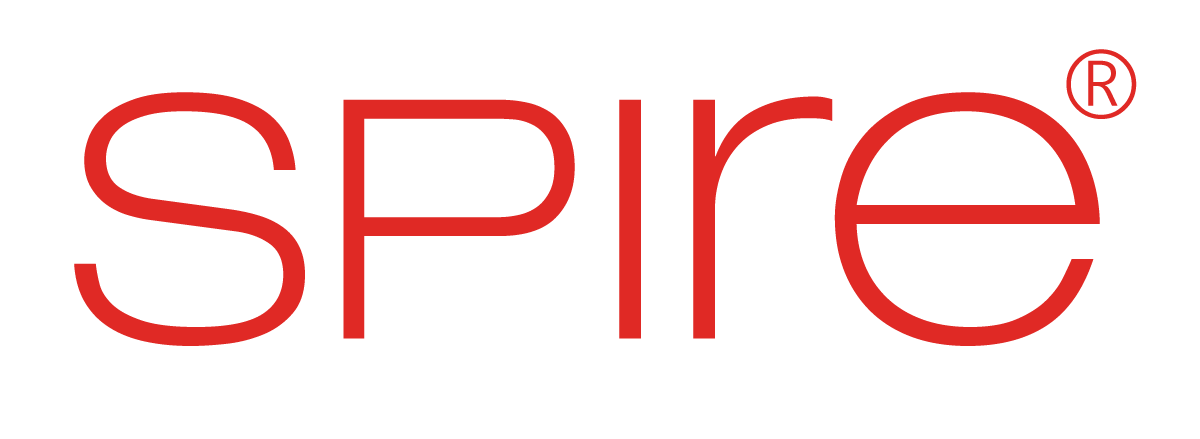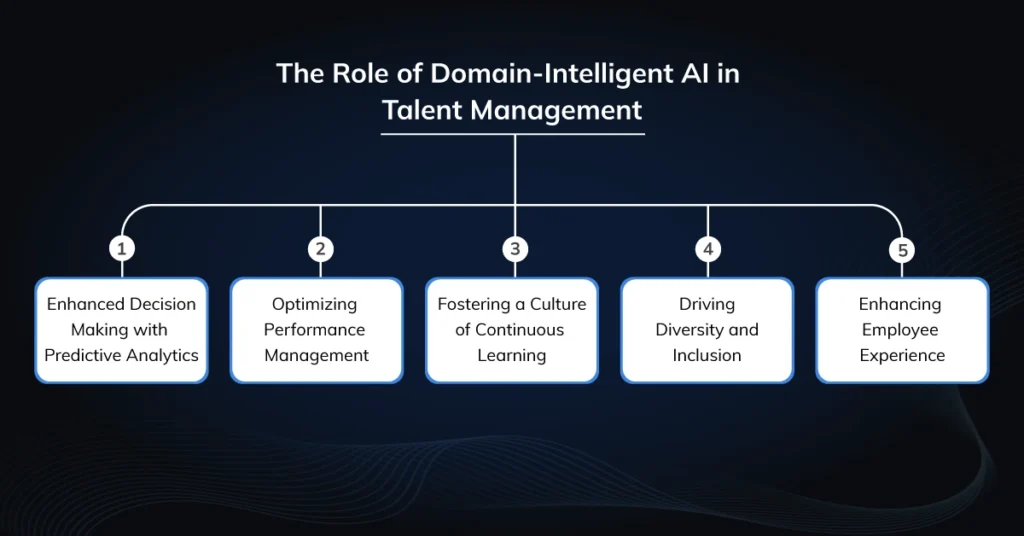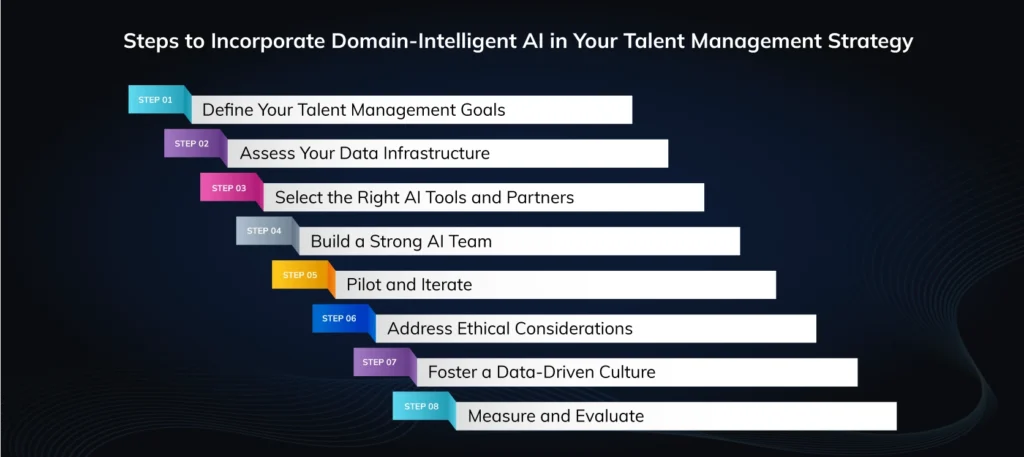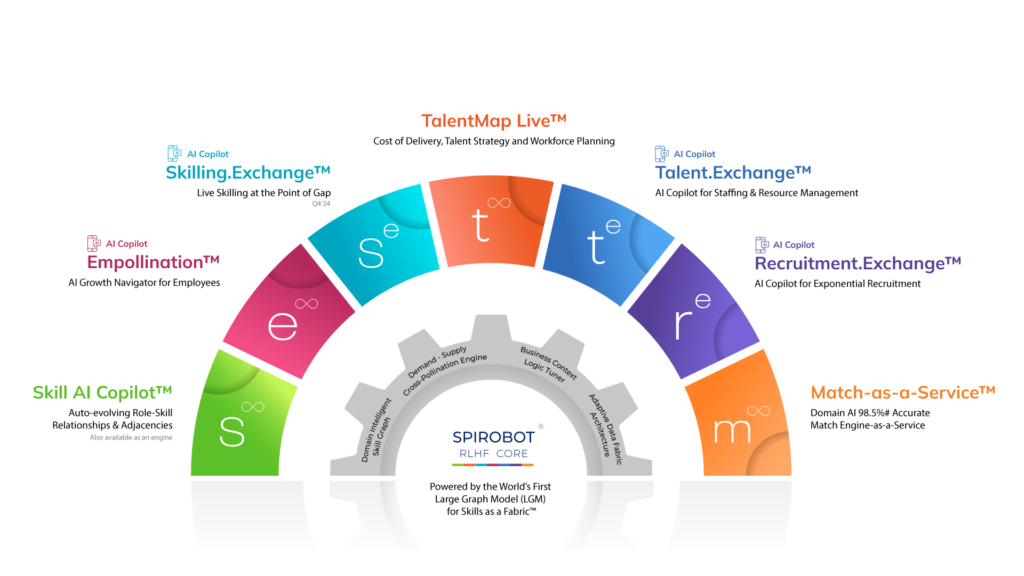The future of work is shrouded in uncertainty. Technological advancements like artificial intelligence (AI) and automation constantly reshape the landscape, while globalization and shifting demographics create new challenges and opportunities. In this dynamic environment, organizations must move beyond static talent management strategies and embrace adaptable approaches that can thrive in disruption. This is where domain-intelligent AI emerges as a powerful tool for organizations to build resilient talent management practices.
What is Talent Management?
Talent management is the strategic process of attracting, retaining, and developing a high-performing workforce. It encompasses the entire employee lifecycle, from recruitment and onboarding to performance management and career development. Effective talent management ensures organizations have the right skills and expertise to achieve their business goals, both now and in the face of future challenges.
Talent management is the strategic process of attracting, retaining, and developing a high-performing workforce.
It encompasses the entire employee lifecycle, from recruitment and onboarding to performance management and career development.
The Role of Domain-Intelligent AI in Talent Management
Domain-intelligent AI is revolutionizing how organizations approach talent management. It transforms traditional HR processes into strategic advantage generators by leveraging its ability to understand industry-specific nuances and analyze complex employee data.
Enhanced Decision Making with Predictive Analytics
Domain-intelligent AI goes beyond descriptive analytics, offering predictive capabilities that inform strategic decision-making. AI can forecast talent supply and demand by analyzing historical data, current trends, and external factors and identifying potential skill gaps and employee attrition rates. This empowers organizations to address challenges and capitalize on opportunities proactively.
Optimizing Performance Management
Performance management is a critical component of talent management, but traditional methods often suffer from subjectivity and inefficiency. Domain-intelligent AI can automate performance data collection, provide objective feedback, and identify high-potential employees. AI can uncover correlations between specific behaviors and performance metrics by analyzing employee performance data alongside business outcomes, enabling organizations to refine performance goals and reward systems. Additionally, AI-powered coaching tools can offer personalized guidance to employees, helping them improve their performance and achieve their career objectives.
Fostering a Culture of Continuous Learning
Talent management is not just about acquiring and retaining employees; it’s also about developing their potential. Domain-intelligent AI can create a culture of continuous learning by recommending personalized development paths based on individual strengths, weaknesses, and career aspirations. AI-powered learning platforms can deliver targeted content, track learning progress, and measure the impact of training on employee performance. By identifying skill gaps and recommending relevant upskilling opportunities, AI helps organizations build a future-ready workforce.
Driving Diversity and Inclusion
Diversity and inclusion are essential for business success, but achieving these goals requires a strategic approach. Domain-intelligent AI can help organizations identify biases in recruitment and promotion processes, ensuring a fair and equitable workplace. AI-powered talent analytics can uncover disparities in opportunities and outcomes, enabling organizations to take corrective actions. Furthermore, AI can facilitate mentorship programs by matching employees with diverse backgrounds and experiences, fostering a more inclusive culture.
Enhancing Employee Experience
A positive employee experience is crucial for attracting and retaining top talent. Domain-intelligent AI can personalize the employee journey by providing tailored recommendations for career development, job opportunities, and employee benefits. AI-powered chatbots can answer employee questions, resolve issues, and provide support, improving employee satisfaction and engagement. By analyzing employee feedback and sentiment, AI can identify areas for improvement in the employee experience and inform HR initiatives.
Organizations can build a resilient talent management strategy that drives business success by harnessing the power of domain-intelligent AI. By automating routine tasks, providing data-driven insights, and personalizing the employee experience, AI empowers HR professionals to focus on strategic initiatives and create a high-performance culture.
Steps to Incorporate Domain-Intelligent AI in Your Talent Management Strategy
Implementing domain-intelligent AI in your talent management strategy requires a systematic approach. Here are some key steps to guide you:
1. Define Your Talent Management Goals
Clearly articulate your organization’s talent management objectives. What are your key challenges? What do you hope to achieve with AI? Understanding your goals will help you identify the most appropriate AI applications.
2. Assess Your Data Infrastructure
AI thrives on data. Evaluate the quality, accessibility, and relevance of your talent data. Identify gaps and prioritize data collection efforts to build a robust foundation for AI-driven insights.
3. Select the Right AI Tools and Partners
Choose AI tools and partners that align with your organization’s needs and budget. Consider factors such as the tool’s capabilities, ease of integration, and the provider’s expertise.
4. Build a Strong AI Team
Assemble a cross-functional team with AI, HR, and business operations expertise. This team will develop, implement, and manage AI initiatives.
5. Pilot and Iterate
Start with a pilot project to test the effectiveness of AI in a specific area of talent management. Gather feedback from employees and stakeholders to refine your approach. Continuously iterate and improve your AI models based on new data and insights.
6. Address Ethical Considerations
AI raises ethical concerns, such as bias and privacy. Develop guidelines and policies to ensure responsible and ethical use of AI in talent management.
7. Foster a Data-Driven Culture
Encourage a data-driven culture within your organization. Provide training and support to help employees understand and utilize AI-generated insights.
8. Measure and Evaluate
Track the impact of AI on your talent management processes and outcomes. Use key performance indicators (KPIs) to measure your AI initiatives’ return on investment (ROI).
Organizations can effectively leverage domain-intelligent AI to build a resilient and high-performing workforce by following these steps.
Spire.AI: Your AI Copilot for Talent Management
Spire.AI is a leading provider of domain-intelligent AI solutions that empower organizations to build a resilient talent management strategy. Here are some ways Spire.AI helps you unlock the full potential of your workforce:
- Automatic AI-generated Employee Skill Profiles: Spire.AI aggregates and analyzes data from various sources like projects, performance reviews, and internal systems to build comprehensive skill profiles for employees. This eliminates manual data entry and provides a data-driven understanding of your talent pool.
- Career Path Simulation and Reskilling Recommendations: Spire.AI helps employees plan their career paths by identifying skills gaps and recommending relevant training programs. The AI considers individual aspirations and organizational needs, ensuring growth opportunities align with future skill requirements.
- Talent Marketplace: Spire.AI facilitates internal mobility by creating a talent marketplace that matches employee skills to internal job openings. This reduces reliance on external recruitment and fosters a culture of learning and development within the company.
By leveraging Spire.AI’s solutions, organizations can streamline their internal talent pipeline processes, make data-driven decisions, and enhance their ability to identify, develop, and retain top talent.
The Future of Domain-Intelligent AI in Talent Management
The future of talent management is inextricably linked to the advancement of domain-intelligent AI. As technology evolves, we can expect even more sophisticated AI applications to transform how organizations manage their workforce.
Hyper-Personalized Employee Experiences
AI will increasingly understand individual employee needs, preferences, and career aspirations. This will lead to hyper-personalized employee experiences, from tailored learning paths and development opportunities to customized benefits packages. AI-powered chatbots and virtual assistants will provide round-the-clock support, efficiently addressing employee inquiries and requests.
Predictive Workforce Planning
Domain-intelligent AI will revolutionize workforce planning by accurately forecasting talent supply and demand. Organizations will be able to anticipate skill gaps, identify potential talent shortages, and proactively develop strategies to address these challenges. AI-driven scenario planning will help organizations navigate uncertain economic conditions and industry disruptions.
Augmented Human Capabilities
Rather than replacing humans, AI will augment human capabilities in talent management. HR professionals will focus on strategic initiatives, leveraging AI to handle routine tasks and provide data-driven insights. AI will become an indispensable tool for decision-making, enabling HR teams to make more informed and effective choices.
Ethical AI and Bias Mitigation
Addressing ethical concerns will be paramount as AI becomes more prevalent in talent management. Organizations will invest in developing AI systems that are fair, unbiased, and transparent. Efforts will be made to mitigate biases in data and algorithms, ensuring that AI is used responsibly and ethically.
Integration with Emerging Technologies
Domain-intelligent AI will seamlessly integrate with other emerging technologies, such as virtual reality (VR) and augmented reality (AR), to create immersive learning experiences. AI-powered talent marketplaces will facilitate internal mobility and collaboration, fostering a culture of innovation and agility.
The future of talent management is bright, with domain-intelligent AI playing a pivotal role in shaping the workforce of tomorrow. Organizations can build a resilient, adaptable, and high-performing workforce by embracing AI and staying ahead of technological advancements.
Final Thoughts
The future of work is undeniably complex, marked by rapid technological advancements and evolving business landscapes. To navigate these complexities, organizations must prioritize building a resilient talent management strategy that can adapt to change. Domain-intelligent AI emerges as a powerful ally in this journey.
By harnessing the potential of AI, organizations can unlock valuable insights, optimize processes, and create a workforce equipped to thrive in the future. From talent acquisition to employee development, AI transforms how we manage people. However, it’s essential to remember that AI is a tool, not a replacement for human judgment and empathy.
As we move forward, we must balance technological innovation and human-centric approaches. Organizations can create a truly synergistic and effective talent management ecosystem by combining AI’s power with human talent’s unique capabilities. The journey towards a resilient talent strategy may be challenging, but the rewards are immense.
By embracing domain-intelligent AI and focusing on building a people-centric culture, organizations can position themselves for long-term success.








